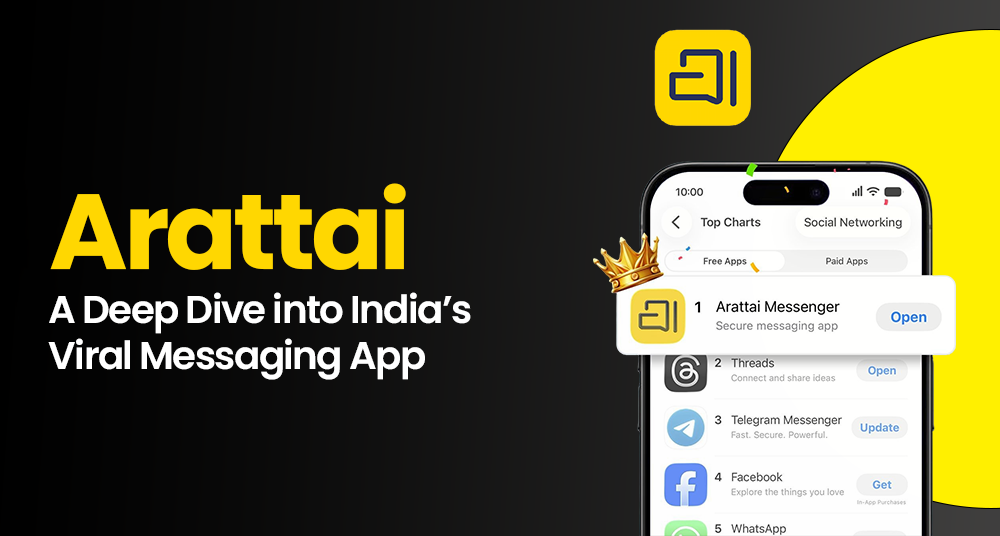In late 2025, the Indian messaging-app ecosystem sparked renewed interest with the rise of Arattai, a homegrown app from Zoho Corporation. Originally launched in 2021, it long flew under the radar. But recently, its daily sign-ups exploded from about 3,000 to 350,000 per day, a nearly 100× jump in just a few days.
Why the surge? Part of it is cultural: the Swadeshi / “Made-in-India” movement; part is practical: concerns about global apps’ privacy policies; part is governmental endorsement and social media momentum. Arattai means “casual chat” in Tamil, and the app promises to deliver a secure, simple alternative to the dominant messaging platforms. In this post, we’ll cover its features, benefits, limitations, and whether it could genuinely challenge giants like WhatsApp.
What Is Arattai?
Arattai is a homegrown Indian messaging app developed by Zoho Corporation, headquartered in Chennai. The word Arattai comes from Tamil, meaning “casual chat,” reflecting its simple and everyday communication purpose. Originally launched in 2021, the app remained relatively low-key until its viral rise in 2025, when downloads skyrocketed due to privacy concerns with global apps and growing support for local alternatives. Designed as a secure, easy-to-use platform, Arattai provides messaging, media sharing, and calling features while storing data within India. Its aim is to offer Indians a trusted, Swadeshi alternative to dominant foreign messaging platforms.
- Developer & Origin: Built by Zoho Corporation (based in Chennai) leveraging their experience in communication and collaboration tools.
- Name Meaning: “Arattai” comes from Tamil, meaning “casual chat” or informal conversation. The branding evokes simplicity and everyday messaging.
- Launch & History: Launched in 2021 but largely low profile until late 2025, when privacy concerns around other apps, plus government nudges, caused a spike in interest.
Unique Features that Make Arattai App Stand Out
Here are the main features users get with Arattai as of now:
| Feature | Details |
| Chat & Media Sharing | One-to-one and group chats; text, photos, videos, voice notes, documents. |
| Voice & Video Calls | Supports high-quality audio/video calls. These calls are end-to-end encrypted. |
| Multi-device Support | Syncing across devices—smartphone, desktop, tablet, even Android TV in some versions. Up to five devices supported. |
| Groups, Channels & Stories | Has group chats, channels (broadcast‐style content), and “stories” or ephemeral media. |
| Privacy / Data Storage | Data stored within India. Policies state no monetization of personal data. Voice & video calls are fully encrypted. Text messages are not yet end-to-end encrypted. Feature in progress. |
| Import Chats from Other Apps | Users can bring over conversations from other messaging platforms. |
What’s New & What’s Driving the Surge
Several factors have combined to make Arattai go viral:
- Massive User Growth: Daily signups skyrocketed from ~3,000 to ~350,000 in three days. The infrastructure is being scaled to meet demand.
- Government & Politicians’ Endorsement: Ministers have encouraged Indians to try out local/homegrown tech. Push for Swadeshi / Atmanirbhar Bharat has given Arattai visibility.
- Privacy Concerns Elsewhere: With global messaging apps (e.g. WhatsApp) in recent years facing scrutiny over privacy, many users seek alternatives. Arattai’s “India-based servers”, “no data monetization” claim resonate under this backdrop.
- Swadeshi and Digital Sovereignty Sentiment: Growing public sentiment to prefer Indian apps for key services, especially communication. This gives Arattai not just user interest but a cultural positioning.
Key Benefits of Arattai Messenger
What do users get out of using Arattai (or hope to get) over continuing with current messaging platforms?
- Local Data Storage & Sovereignty: Data staying in India makes people feel more secure about how their data is handled.
- No Cost, Free to Use: Arattai is free, with no subscription or mandatory fees.
- Feature Rich Enough: It offers most of what users expect—media sharing, voice calls, channels, stories. For many users, that’s sufficient.
- Simplified & Familiar UI: It seems to resemble WhatsApp and other familiar messaging apps, lowering friction for switching.
- Potential for Better Trust: Because it is “made in India”, not foreign, with stated privacy-oriented design, some users are drawn by trust and patriotism.
Limitations & What’s Missing
Despite its rapid rise, Arattai has some gaps and challenges:
- Text Message Encryption Not Complete: As of now, messages are not end-to-end encrypted. This is often singled out as a key privacy gap vs WhatsApp.
- Reliability Under Heavy Load: Given the sudden surge, some users report delays in signup, message sync issues, or OTP delays. Infrastructure is being upgraded.
- Feature Parity Not Full: Things like disappearing messages, full privacy controls (locking chats, advanced permissions) may be less mature or absent.
- Network Effects & User Base: WhatsApp has hundreds of millions of daily users in India; getting people to switch is a big challenge.
- Trust & Privacy Scrutiny: Even though data is stored locally and no monetization is claimed, privacy-conscious individuals want full encryption and transparency. Users will watch closely.
How It Compares to WhatsApp & Other Messaging Apps
Here are some comparative points:
| Aspect | Arattai | WhatsApp / Others |
| End-to-end encryption | Only for voice/video calls; not yet for text messages. | Full message & media encryption by default. |
| Data localization | Data stored in India; claimed zero monetization. | Data storage practices vary; often involves foreign jurisdictions. |
| User growth | Recent viral surge, governmental backing. | Long-standing dominance; large ecosystem. |
| Devices supported | Multi-device, desktop, Android TV, etc. | Also strong multi-device support, high stability. |
| Feature set | Chats, media sharing, channels, stories, meetings for many users. Missing some privacy features still. | Very mature; wide adoption, strong privacy protections. |
Is Arattai Free? Cost & Pricing
Yes—Arattai is currently free to download and use for personal messaging. There is no subscription model yet. Zoho also claims the app isn’t monetizing user data or selling personal information.
If monetization does come, likely routes could be from business tools, channels, or optional features—but as of now, Arattai’s pitch is “secure, simple, free.”
Availability, Supported Platforms & Use Cases
- Platforms: Android and iOS for mobile. Also desktop versions. Possibly Android TV.
- Languages: Supports multiple Indian and international languages—helps with adoption across regions.
- Use Cases:
- Personal chat, group chat
- Media sharing (photos, files, videos)
- Voice/video calls
- Stories / ephemeral media sharing
- Public channels & broadcast announcements
- Meetings / scheduled group calls in some versions
Security & Privacy Details
Understanding privacy and security is crucial:
- Encrypted Calls: Audio and video calls are end-to-end encrypted.
- Messages Not Fully Encrypted Yet: Text messages still pass through servers in unencrypted or partially encrypted form—making them vulnerable. This is actively being addressed.
- Data Sharing Policy: Arattai states it does not share user data with third parties without user consent; however, some data might be shared with service providers involved in delivering the service (e.g. partners, infrastructure providers) on a need-to-know basis.
- Storage Location: Data stored in India, which helps align with local data laws and user expectations.
Benefits for Users
- More Control & Trust: Because it’s made locally, with data storage in India, many users feel more confident about control over their data.
- Simple Experience: For people familiar with WhatsApp, Arattai feels intuitive—familiar chat, voice, video, media sharing, stories, etc.
- Free & Inclusive: No cost barrier; works on multiple devices. Potentially lower friction for people switching platforms.
- Aligns with Swadeshi / Nationalism: For many, using local apps matters beyond feature lists—it’s also about identity and preference.
Challenges & What Needs Improvement
- Full Encryption Needed: Implementing end-to-end encryption for messages is high priority. Without it, privacy-conscious users may be hesitant.
- Server Scaling & Reliability: Rapid growth has led to infrastructure strain. Lag, delays, and potentially sync problems have been noted.
- Feature Gaps vs Mature Apps: Some advanced features (disappearing messages, message locking, advanced privacy controls) are not yet fully fleshed out.
- User Transition & Network Effects: Getting your friends and family onto a new app is hard. The value of messaging apps increases with more users. Gaining sustained daily active use will be key.
- Trust & Perception: Even though claims exist about privacy, users will test them. Transparency, audits, visible security practices will matter.
Market Implications & Broader Context
- Swadeshi / Digital Sovereignty Movement: Arattai joins a wave of initiatives pushing Indian tech solutions. Government endorsements help visibility and adoption.
- Competition Pressure on Global Giants: WhatsApp, Telegram, Signal may need to further improve local compliance, privacy, and data practices if homegrown alternatives gain traction.
- Potential for Enterprise / Business Use: With channels, broadcast, content sharing, Arattai could evolve features for small businesses, brands, local services.
- Innovation & Trust Factor: As users become more wary of privacy, surveillance, and data leaks, apps promising local control, clear policies, and real encryption have an opportunity.
Will Arattai Replace WhatsApp? Realistic Expectations
- It probably won’t happen overnight. WhatsApp has massive adoption, ecosystem features, international reach.
- But Arattai can carve out a significant niche, especially among users who care about privacy, data location, and national identity.
- If Arattai improves missing features (full encryption, reliability, advanced privacy controls), and retains trust, it could become a serious alternate default for many.
Final Thoughts
Arattai’s recent viral surge is no fluke—it reflects growing demand for local, privacy-aware alternatives in messaging. While the app still has some catching up to do, especially around text encryption and stability, its current feature set, governmental backing, and user momentum give it a strong foundation. For Indians curious about switching, it offers a promising path: familiar messaging experience + local control + potential for trustworthy privacy. Watching how Arattai evolves in the next 6-12 months, and how it responds to user feedback, will determine whether it becomes more than just a trend.
Frequently Asked Questions (FAQs)
Is Arattai free to use?
Yes, currently Arattai is free with no subscription or paid tiers.
Does Arattai support end-to-end encryption for messages?
Not yet. Audio and video calls are end-to-end encrypted. Text messages are still awaiting full encryption.
On which platforms are Arattai available?
Available on Android, iOS, desktop (PC/Mac), tablet, and Android TV.
Can I import my chats from WhatsApp or other apps?
Yes—Arattai provides functionality to import conversations from other chat platforms.
Is my data stored in India?
Yes, per Zoho’s statements, Arattai stores user data locally in India.
How many users does Arattai have / how fast is it growing?
The app saw daily sign-ups jump from ~3,000 to ~350,000 within days.
What key features are missing currently?
Text messages are not yet end-to-end encrypted; lacking some advanced privacy tools (chat locking, disappearing messages, etc.).
Related Blog: Build a Messaging App Like Arattai Messenger






What do you think?
It is nice to know your opinion. Leave a comment.